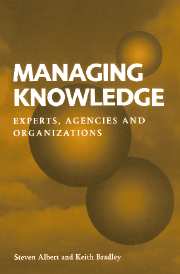Book contents
- Frontmatter
- Contents
- List of figures
- List of tables
- Introduction: the supply-side in context
- Part 1 Expert employees and their new organization
- Part 2 The labour market and the expert employee
- 7 AT&T's special employment policies for expert employees
- 8 An external temporary agency and expert employees
- 9 The Hollywood agency system
- 10 The Internet as an agent
- 11 Labour market segments re-examined
- 12 Agents and intellectual capital
- Appendix A Formal exposition of Winston model
- Appendix B Agency employment and search costs
- Notes
- References
- Index
12 - Agents and intellectual capital
Published online by Cambridge University Press: 23 November 2009
- Frontmatter
- Contents
- List of figures
- List of tables
- Introduction: the supply-side in context
- Part 1 Expert employees and their new organization
- Part 2 The labour market and the expert employee
- 7 AT&T's special employment policies for expert employees
- 8 An external temporary agency and expert employees
- 9 The Hollywood agency system
- 10 The Internet as an agent
- 11 Labour market segments re-examined
- 12 Agents and intellectual capital
- Appendix A Formal exposition of Winston model
- Appendix B Agency employment and search costs
- Notes
- References
- Index
Summary
… the comparison of different … points of view has one purpose – changing the reader's point of view.
Sergie Eisenstein, The Short Fiction ScenarioAs opportunities and technologies change, it is reasonable to assume that consumption and preferences will also change (see Becker (1976) and Marshall (1946)). We have described how changing opportunities and technologies encouraged experts to abruptly leave traditional organizations in pursuit of greater control over their lives and careers. Conditions external to organizations influence this break as much as the internal dynamics of an organization. As long as organizations have in-built defence mechanisms that resist change, there will exist a motive for empowered experts to break from traditional organizations.
This break is not a gradual transformation of the labour market since: (i) the results of such breaks are incompatible with traditional organizations and (ii) for the first time in history technology permits information to be delivered on a one-to-one basis and thereby dispenses with the need for a centrally located information based workplace. It is because of these fundamental differences and characteristics that a break is said to punctuate relative stasis.
We do not, however, suggest that all organizational structures will become obsolete or that one form of organizational system is necessarily better than another. We simply emphasize that an examination of the supply-side preferences of expert employees can seriously affect arguments that surround organizational structures. What appears as a demand-sided change may, in fact, be significantly influenced by individuals.
Our theory suggests a lineage from changing opportunities and technologies to a break towards at-will contracts, agency-led, expert labour market.
- Type
- Chapter
- Information
- Managing KnowledgeExperts, Agencies and Organisations, pp. 160 - 168Publisher: Cambridge University PressPrint publication year: 1997



